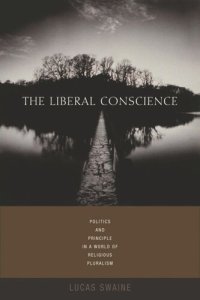
Ebook: The Liberal Conscience: Politics and Principle in a World of Religious Pluralism
Author: Lucas Swaine
- Year: 2005
- Publisher: Columbia University Press
- Language: English
- pdf
Combining discussions of political philosophy with real-world events, Lucas Swaine proposes solutions to the seemingly intractable conflict between liberalism and theocracy. He explores the nature and development of theocratic communities and the moral and political challenges they pose to liberal societies. Calling upon liberals to redefine and reassert the fundamental importance of liberty of conscience, Swaine argues that liberal societies can reinvigorate their own traditions while also assuaging religious conflict. Liberalism will become more appealing to the values and concerns of theocrats if liberals modify and clarify the commitment to freedom of conscience and take a fresh approach to conceptualizing and promulgating their principles, institutions, and laws. By opening a dialogue between theocracy and liberalism and offering strategies for interacting with politically ambitious theocrats, Swaine offers a new and vital perspective on the role of religion in liberal, multicultural societies.
"A new liberal theory awaits, one that properly acknowledges the fundamental values and commitments of theocrats and liberals alike."—from The Liberal of Conscience
In recent years, the battle between liberalism and theocracy has taken center stage around the globe. To many it is a dispute that can only end in a confrontation of competing values and worldviews. In this bold new work, Lucas Swaine combines discussions of political philosophy and real-world events to provide solutions to this seemingly intractable conflict. By opening a dialogue between theocracy and liberalism and offering strategies for interacting with politically ambitious theocrats, Swaine offers new and vital perspectives on the role of religion in liberal, multicultural societies.
Swaine begins by exploring the nature and development of theocratic communities and the moral and political challenges they pose to liberal societies. He argues that in their treatment of theocratic communities, liberal societies have failed to uphold their own stated principles of religious toleration. They have also neglected to formulate a suitable schema for treating theocratic communities ensconced in liberal democracies and to provide reasons for theocrats to affirm liberal institutions. Swaine calls upon liberals to redefine and reassert the fundamental importance of liberty of conscience. By doing so, liberal societies will reinvigorate their own traditions, while also assuaging religious conflict. In addition to philosophical arguments, Swaine proposes a new legal standard that offers theocratic communities quasi sovereignty within liberal democracies.
Theocrats also have much to gain from embracing liberalism and the principle of liberty of conscience. Swaine argues that liberalism can be made more appealing to the values and concerns of theocrats if the liberal commitment to freedom of conscience is clarified and modified and if liberals take a fresh approach to conceptualizing and promulgating liberal principles, institutions, and laws.